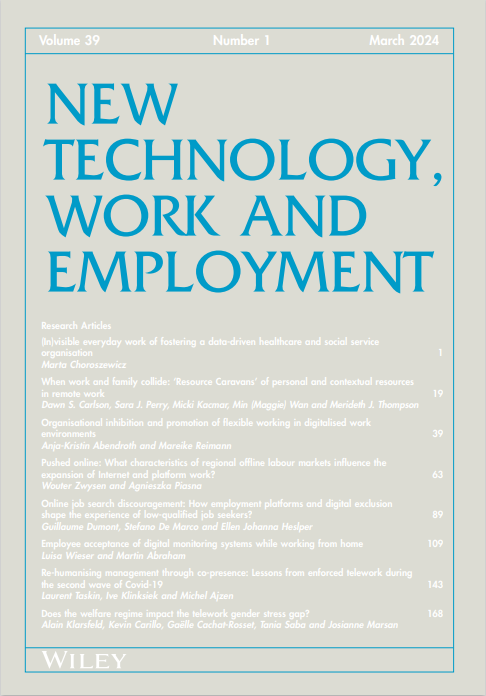福利制度会影响远程工作的性别压力差距吗?
IF 7.3
3区 管理学
Q1 ERGONOMICS
引用次数: 0
摘要
经过几十年的缓慢推广,远程工作的接受程度在大流行病危机期间急剧加快,成为一种主流工作方式。然而,人们对远程工作设计对员工压力的影响仍然知之甚少,尤其是在因重大健康危机而导致压力高涨的时候,而此时组织帮助缓冲压力至关重要。我们利用福利制度文献,研究了在大流行病危机期间,远程工作需求/资源因素对压力的影响,以及在平等或不平等福利制度下性别的调节作用。通过分析从法国和魁北克省 4602 名受访者那里收集到的数据,我们发现远程工作需求(家庭对工作的干扰、组织隔离、情感隔离)对两种福利制度下的压力都有积极影响。我们还发现,在性别平等程度较高的福利制度下,性别压力差距比在性别平等程度较高的福利制度下更大。在两种背景研究中,男性和女性的压力受到的影响并不相同。本研究讨论了对研究和实践的贡献,以及局限性和未来潜在的研究途径。本文章由计算机程序翻译,如有差异,请以英文原文为准。
Does the welfare regime impact the telework gender stress gap?
After decades of slow diffusion, the acceptance of telework has dramatically accelerated during the pandemic crisis, becoming a mainstream work practice. However, little is still known on the impact of telework design on employee stress, particularly when stress is high due to a major health crisis, at a time when it is crucial that organizations help buffer it. Using the welfare regime literature, we study the effects of telework demands/resources factors on stress and the moderating effects of gender in more or less egalitarian welfare regimes, during a pandemic crisis. Analyzing data collected from 4602 respondents in France and Quebec, we find that telework demands (family interference with work, organizational isolation, emotional isolation) impact stress positively in both welfare regimes. We also find that the gender stress gap is higher in a more gender-inegalitarian welfare regime than in a more gender-egalitarian welfare regime. Men's and women's stress is not impacted in the same manner in the two contexts studies. Contributions to research and practice are discussed, along with limitations and potential future research avenues.
求助全文
通过发布文献求助,成功后即可免费获取论文全文。
去求助
来源期刊

New Technology Work and Employment
Multiple-
CiteScore
10.50
自引率
15.50%
发文量
36
期刊介绍:
New Technology, Work and Employment presents analysis of the changing contours of technological and organisational systems and processes in order to encourage an enhanced and critical understanding of the dimensions of technological change in the workplace and in employment more generally. The journal is eclectic and invites contributions from across the social sciences, with the primary focus on critical and non-managerial approaches to the subject. It has the aim of publishing papers from perspectives concerned with the changing nature of new technology and workplace and employment relations. The objective of the journal is to promote deeper understanding through conceptual debate firmly rooted in analysis of current practices and sociotechnical change.
 求助内容:
求助内容: 应助结果提醒方式:
应助结果提醒方式:


